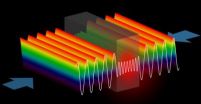(Press-News.org) ST. PAUL, Minn. – People with multiple sclerosis (MS) may find it harder to learn, remember or process information on warmer days of the year, according to new research released today that will be presented at the American Academy of Neurology's 63rd Annual Meeting in Honolulu April 9 to April 16, 2011.
"Studies have linked warmer weather to increased disease activity and lesions in people with MS, but this is the first research to show a possible link between warm weather and cognition, or thinking skills, in people with the disease," said study author Victoria Leavitt, PhD, with the Kessler Foundation in West Orange, New Jersey.
For the study, 40 people with MS and 40 people without MS were given tests that measured learning, memory and the speed at which they processed information. Those people with MS also underwent brain scans. The daily temperature on the days the tests were taken was also recorded.
The study found that people with MS scored 70 percent better on thinking tests during cooler days compared to warmer days of the year. There was no link between thinking test scores and temperature for those without MS.
"With more research, this information might help guide people with MS in life decisions and their doctors with clinical treatment. Scientists may also consider the effect of warmer weather on cognition when conducting clinical trials," said Leavitt.
###
The American Academy of Neurology, an association of more than 22,500 neurologists and neuroscience professionals, is dedicated to promoting the highest quality patient-centered neurologic care. A neurologist is a doctor with specialized training in diagnosing, treating and managing disorders of the brain and nervous system such as Alzheimer's disease, stroke, migraine, multiple sclerosis, brain injury, epilepsy and Parkinson's disease.
For more information about the American Academy of Neurology and its upcoming Annual Meeting, visit http://www.aan.com.
Warm weather may hurt thinking skills in people with MS
2011-02-18
ELSE PRESS RELEASES FROM THIS DATE:
Research predicts future evolution of flu viruses
2011-02-18
New research from the University of Pennsylvania is beginning to crack the code of which strain of flu will be prevalent in a given year, with major implications for global public health preparedness. The findings will be published on February 17 in the open-access journal PLoS Genetics.
Joshua Plotkin and Sergey Kryazhimskiy, both at the University of Pennsylvania, conducted the research with colleagues at McMaster University and the Institute for Information Transmission Problems of the Russian Academy of Sciences. Plotkin believes that his group's computational ...
The brain as a 'task machine'
2011-02-18
The portion of the brain responsible for visual reading doesn't require vision at all, according to a new study published online on February 17 in Current Biology, a Cell Press publication. Brain imaging studies of blind people as they read words in Braille show activity in precisely the same part of the brain that lights up when sighted readers read. The findings challenge the textbook notion that the brain is divided up into regions that are specialized for processing information coming in via one sense or another, the researchers say.
"The brain is not a sensory machine, ...
Eggs' quality control mechanism explained
2011-02-18
To protect the health of future generations, body keeps a careful watch on its precious and limited supply of eggs. That's done through a key quality control process in oocytes (the immature eggs), which ensures elimination of damaged cells before they reach maturity. In a new report in the February 18th Cell, a Cell Press publication, researchers have made progress in unraveling how a factor called p63 initiates the deathblow.
In fact, p63 is a close relative of the infamous tumor suppressor p53, and both proteins recognize DNA damage. Because of this heritage it ...
Male fertility is in the bones
2011-02-18
Researchers have found an altogether unexpected connection between a hormone produced in bone and male fertility. The study in the February 18th issue of Cell, a Cell Press publication, shows that the skeletal hormone known as osteocalcin boosts testosterone production to support the survival of the germ cells that go on to become mature sperm.
The findings in mice provide the first evidence that the skeleton controls reproduction through the production of hormones, according to Gerard Karsenty of Columbia University and his colleagues.
Bone was once thought of as a ...
Bears uncouple temperature and metabolism for hibernation, new study shows
2011-02-18
This release is available in French, Spanish, Arabic, Japanese and Chinese on EurekAlert! Chinese.
Several American black bears, captured by the Alaska Department of Fish and Game after wandering a bit too close to human communities, have given researchers the opportunity to study hibernation in these large mammals like never before. Surprisingly, the new findings show that although black bears only reduce their body temperatures slightly during hibernation, their metabolic activity drops dramatically, slowing to about 25 percent of their normal, active rates.
This ...
Scientists build world's first anti-laser
2011-02-18
New Haven, Conn.—More than 50 years after the invention of the laser, scientists at Yale University have built the world's first anti-laser, in which incoming beams of light interfere with one another in such a way as to perfectly cancel each other out. The discovery could pave the way for a number of novel technologies with applications in everything from optical computing to radiology.
Conventional lasers, which were first invented in 1960, use a so-called "gain medium," usually a semiconductor like gallium arsenide, to produce a focused beam of coherent light—light ...
The real avatar
2011-02-18
That feeling of being in, and owning, your own body is a fundamental human experience. But where does it originate and how does it come to be? Now, Professor Olaf Blanke, a neurologist with the Brain Mind Institute at EPFL and the Department of Neurology at the University of Geneva in Switzerland, announces an important step in decoding the phenomenon. By combining techniques from cognitive science with those of Virtual Reality (VR) and brain imaging, he and his team are narrowing in on the first experimental, data-driven approach to understanding self-consciousness.
In ...
Taking brain-computer interfaces to the next phase
2011-02-18
You may have heard of virtual keyboards controlled by thought, brain-powered wheelchairs, and neuro-prosthetic limbs. But powering these machines can be downright tiring, a fact that prevents the technology from being of much use to people with disabilities, among others. Professor José del R. Millán and his team at the Ecole Polytechnique Fédérale de Lausanne (EPFL) in Switzerland have a solution: engineer the system so that it learns about its user, allows for periods of rest, and even multitasking.
In a typical brain-computer interface (BCI) set-up, users can send ...
Skeleton regulates male fertility
2011-02-18
NEW YORK (February 17, 2011) – Researchers at Columbia University Medical Center have discovered that the skeleton acts as a regulator of fertility in male mice through a hormone released by bone, known as osteocalcin.
The research, led by Gerard Karsenty, M.D., Ph.D., chair of the Department of Genetics and Development at Columbia University Medical Center, is slated to appear online on February 17 in Cell, ahead of the journal's print edition, scheduled for March 4.
Until now, interactions between bone and the reproductive system have focused only on the influence ...
Put major government policy options through a science test first, biodiversity experts urge
2011-02-18
Scientific advice on the consequences of specific policy options confronting government decision makers is key to managing global biodiversity change.
That's the view of leading scientists anxiously anticipating the first meeting of a new Intergovernmental Panel on Climate Change (IPCC)-like mechanism for biodiversity at which its workings and work program will be defined.
Writing in the journal Science, the scientists say the new mechanism, called the Intergovernmental Platform on Biodiversity and Ecosystem Services (IPBES), should adopt a modified working approach ...


